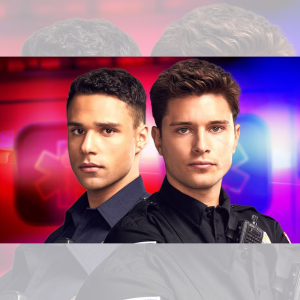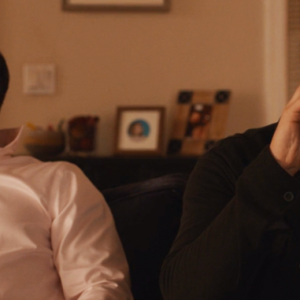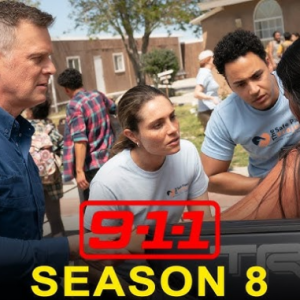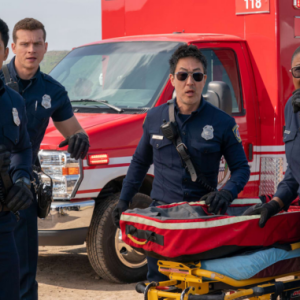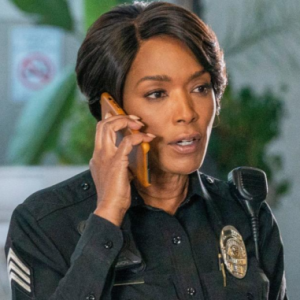For five seasons now, actor Brian Michael Smith has been saving the day as hunky, yet humble firefighter Paul Strickland on Fox’s procedural drama 9-1-1: Lone Star.
And those heroics have continued off-screen, too. Because, as the first out Black trans man in a series regular role on broadcast TV, Smith has used his time in the spotlight to continually advocate for trans and QPOC communities, and has even joined the Board Of Directors for the Human Rights Campaign.
As we prepare to say goodbye to Station 126 on the upcoming series finale of Lone Star, we asked Smith to be the latest guest in our rapid-fire Q&A series, Dishin’ It, inviting the star to both reflect back on what the show’s meant to him and to look ahead to the future.
In our conversation below, Smith opens up about what he’s learned from the show—in terms of real-life rescue skills and other life lessons—shares the place that helped him find community and purpose, and shares some empowering advice for queer folks everywhere as we face the rest of the year ahead.
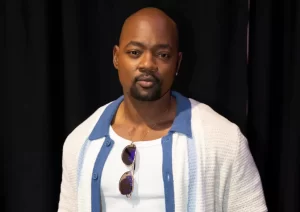
Our ice-breaker: Is there a piece of media—whether a movie, TV series, book, album, theater, video game, etc…—that has played an important role in your own understanding of queerness and the queer community? Why does it stand out to you?
I think my understanding of queerness and the queer community beyond my own personal experiences came from a variety of sources. Working at the LGBT Center in Manhattan was transformative—it connected me to the broader community and its history in ways I hadn’t previously understood. Watching Paris Is Burning, The Aggressives, Noah’s Ark, and The L Word opened my eyes to the breadth of our community and the incredible tapestry of experiences within it.
But the piece of media that had the most profound impact on me was Jamison Green’s book, Becoming A Visible Man. It was the first time I saw a story that mirrored my own, a narrative rooted in gender rather than sexuality. Up until then, every narrative I’d encountered—whether on TV, in movies, or in conversations around me—was focused on sexuality. Reading Jamison Green’s book was a revelation. It was the first step in understanding that I was trans, that I wasn’t alone, and that there was a community of people like me.
Jamison’s story and the book connected me to a community of trans men, deepened my understanding of my identity as a trans man, and helped me see the important role we’ve played historically in the queer community. It showed me that I could live a full and authentic life without betraying myself. Before encountering that book, I thought I was singular, but Becoming A Visible Man helped me see how my journey connected to the larger queer community. It was a pivotal moment in my understanding of my identity and my place within the rich and diverse world of queerness.
With 9-1-1: Lone Star soon coming to an end, what’s one of the biggest things you’d say you learned about yourself while working on the series?
I’ve learned a lot about myself over the past 5 years working on this show. In many ways, I could say it was like another coming-of-age. So much has happened in the duration: I moved across the country from NYC to LA, endured the pandemic, the strikes all while working on it.
I’d say the biggest thing I learned is how to balance preparing and surrendering. In my crafting as an actor but also in life. I went to acting school and learned techniques for how to prepare for a performance and get myself ready to do what the scenes called for. And the process takes time. You need time with the script to not only learn the words but know what’s going on and what you need to do to get yourself in the space you need to live out the scene. In theatre, you have all this time to rehearse, but in TV, and in ACTION TV that is not the case.
Sometimes, the script was in revisions and you only got a couple pages to shoot your scene and your lines are different. Or you were going to rehearse the scene but the previous scene had a tech issue and we’re losing the location so we have to just jump into the emotional scene you thought you were doing the next day right now. Or you rehearsed the scene fine but when all the special effects are going, you’re trying to deliver this deep emotional scene hanging from a cable getting drenched in freezing water.
All these things that are out of my control would be happening but I’m still responsible for my performance. And I had to learn how to adapt my process to the production.
